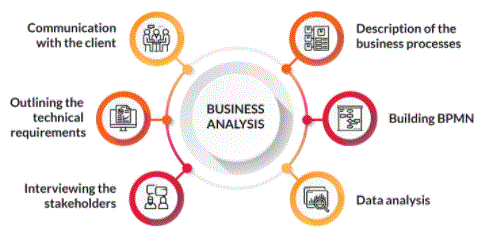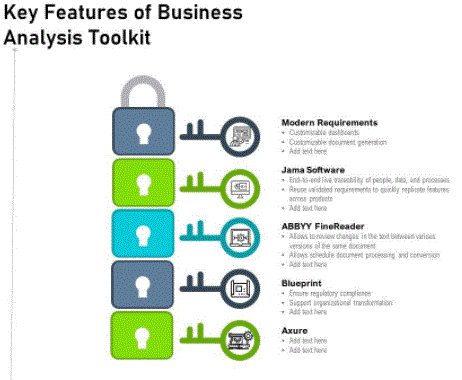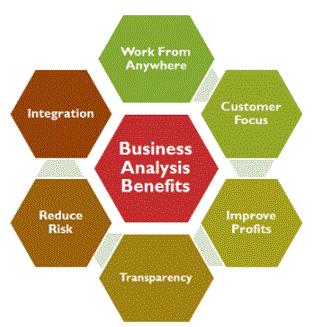
Business Analysis is a disciplined method for training and handling change in institutions, whether they are for-profit businesses, governments, or non-profits. Business analysis is used to determine and communicate the demand for transformation in how organizations work, and to enable that change.
- Introduction of Business Analysis
- Tools of Business Analysis
- Breaking Opportunities and Impact of Business Analysis
- Features / Characteristics
- Types/methods of Business Analysis
- Synatx of Business Analysis
- How it works
- Why it is needed and important?
- Trends of Business Analysis
- Benefits of Business Analysis
- Conclusion
Introduction for Business Analysis:
Business analysis is a practice of empowering change in organisational structure, by defining needs and recommending solutions that bring value to stakeholders. A set of activities and strategies used in business analysis are described in the Business Body Analysis Guide® (BABOK® Guide). Learn more about business analysis. A Business Analyst is a change agent. Business Analysis is a systematic way of presenting and managing change to organisations, whether they are for-profit, government, or non-profit organisations.
Qualifications for business analytics staff include not only a business analyst, but also a business plan analyst, program analyst, needs engineer, process analyst, product manager, product owner, business analyst, business builder, management consultant, business intelligence analyst, business scientist, scientist and scientist. Many other functions, such as management, project management, product management, software development, quality assurance and collaborative design rely heavily on business analytics skills for success.
As business analysts, we identify and define solutions that will increase the value that an organisation brings to its stakeholders. Business analysts work at all levels of the organisation and may be involved in everything from defining a strategy, creating a business architecture, taking a leadership role by defining the principles and requirements of programs and projects or supporting the continuous development of technology and its processes.
We have specialised experience as a guide and lead a business in an unknown or unmarked area, to get you where you are going. The value of a business analysis lies in achieving profits, avoiding costs, identifying new opportunities, understanding the skills needed and modelling an organisation. By successfully using business analysis, we can ensure that the organisation recognizes these benefits, ultimately improving the way it conducts business.

Tools in Business Analysis:
Business analysis is the process of finding business needs.
Today’s needs are seen as the best tool for business analysis. Provides participatory requirements for request, explanation, and analysis. It helps to define needs in writing and in appearance. Supports drawing, mockup, Smart Documents, case use, tracking analysis, foundation, review management and various attractive tools. Monday is a tool that allows you to analyse your performance and manage your team in one place. Provides a dynamic dashboard to easily visualise data.
ClickUp is a customizable business analytics tool that lets you create your own custom ideas. This business analysis tool provides the most complete time management and task management and facilitates collaboration between business units. This app allows you to provide and resolve comments on tasks. It helps you to set priorities in the workplace without suffering.
Zoho Projects is a project management tool created by Zoho. The software helps you to plan your projects, assign tasks, and communicate effectively.
Smartsheet is a BPM tool widely used in project management. Provides specialised business process management. It also allows you to coordinate and perform better, faster, and more economical processes.
Adobe Acrobat X lets you edit content or images without leaving a PDF file. By using this software, you can edit a PDF document in your office. You can also use this software to create, protect, and distribute PDF files. It helps you to master PDF documents for CD / DVD applications, and allows you to print.
Helps Business Analysts to improve productivity while creating project reports or artefacts.

Features / Characteristics of Business Analysis:
1. Good Communication Skills
Business analysts need to have communication skills as they have to communicate with various stakeholders. They need to understand why what they are doing is beneficial and explain it to the participants. This includes persuading people to work in jobs that may not be a priority for them. For example, a business analyst may need to consult the Marketing Director to help explain CRM website performance metrics. Good communication skills include oral and written communication. Business analysts who have excellent verbal communication skills but who struggle with written words may decide to seek help from the writing staff and talented writers at Essay Mama. Different types of communication, such as forums, meetings and other informal processes may be required for all participants to access the board.
2. Practical Listening Skills
Business analysts use effective listening skills to ensure that all stakeholders are listened to. They understand the importance of eye contact with the speakers and always try to convey exactly how they feel about what they are saying. Observing words and body language is important for getting to the root of what is being said. To do this, they need to know how to duplicate any internal or external distractions. Business analysts can keep an open mind and agree on different ideas and know when to present the lesson. They are able to consider all the entries without being disturbed by any disagreements. There will always be participants who disagree and part of their ability to deal with this.
3. Problem Solving Skills
Many business analysts say that one of the things they love most about their job is solving problems. Problem solving can involve analytical thinking and critical thinking. It includes resolving conflicting information situations, incomplete information, lost information etc. Solutions are not always easy when problems arise within a company. Analysts often have to evaluate multiple situations and activities in order to find a solution. Understanding the problem often involves examining the obvious symptoms, in the form of cost, sales, and performance metrics.

- You like to bring individuals and you to some conclusions regarding however things ought to work
- You like operating a lot of with individuals than exploitation software system
- He likes to barter
- If your natural instinct and aptitude are unit simpler with individuals than an exploitation software system then you would like to participate within the BPA role.
- Enjoy making an attempt to work out however the software system works or however the devices work unremarkably, or, If you’re Associate in Nursing engineer then you would like to aim for the kind of business arrange analyst role.
- Many engineers WHO {are interested|have Associate in Nursing interest} in getting into the analytical field tend to travel to the analysis field as a result of they will carry as several of their skills as an engineer as you’ll be.
- Generalist BA is what I prefer to decide as a whole business analyst.
- I mix the advantages and drawbacks of being a general business analyst (as somebody WHO has become a GBA) and it’s not a task for anyone to enter.
- Casandra launched as a QA analyst. Casandra has shifted to the BSA’s role of conducting technical analysis. Casandra was concerned in an exceedingly project within which she learned to figure arduous in business.
- He then learned to try and do a great deal of method style work and a great deal of soppy skills like handling resistance and lots of different skills you wish to be an honest method analyst. Over time Casandra has full-grown into a winning business analyst.
Types/methods of Business Analysis:
The 3 forms of Business Analyst archetypes are:
Business method Analyst (BPA): targeted on the business aspect of things rather than I.T. on the aspect.
Business analyst (BSA): focuses on the system aspect of objects, sometimes on the other polar aspect of the BPA.
Generalist Business Analyst (GBA): begined as a BPA or BSA and has full-grown skills placed in an exceedingly position they didn’t start in.
Type 1: Business method Analyst
Type 2: Business analyst
The irreversible aspect of the BPA role is clearly that if you wish to play with information. If you’re a sort of person:
Type 3: General Business Analyst
How its works:
In this process, a business analyst investigates, explains, and records requirements. From this document, the Business Analyst will be able to determine the scope, timeline, and resources of the project. The business analyst will act as a liaison between the client and the technical team. There are various types of business analysis tools available.
Business Process Drawing, Text, Presentation, CRM, Mathematics, Notes, Communication (Calls / Meetings), Sharing, Automatic, Thinking, Visibility, Data Acquisition and Data Collection, Mindfulness, Visibility, Project Management, Data Analysis, Data Analysis, , Planning, and Model Building are just a few categories.
Why it is important?
Business analysis is the process of identifying business needs, borrowing and finding solutions to business problems. It involves devising strategies to make the right plan and act accordingly. Business analysis is one of the most important pillars of business configuration as it is the way business analysts classify problems into smaller ones and determine your allocation of both financial and human resources to solve the problem. For every company, it is equally important to get a solid foundation in the financial market. This is where the role of business analysts plays, and what a business analytical course may not teach you how to directly, or indirectly contribute to your company’s finances.
Increased ROI – To find out where a business stands, it is important to check its ROI (Refund); ROI measures the value of its business and whether there is an increase or decrease in revenue. Business analysis can tell you that you need to make some changes to bring in more ROI, when costs need to be reduced and profits need to be increased again in the same way.
Cost-cutting – Using business analysis to develop various cost-cutting strategies for a project, informing the team about how it works effectively and what strategies can help reduce company costs is an important factor. It also opens up a variety of ways to solve ongoing problems and affordable ways.
Decision-making – The most important aspect of business analysis is making decisions on behalf of the company to stakeholders or investors. Reasonable discussions about the company have been active, what are the problem areas or what factors control the overall cost of the company as a whole and how to achieve the maximum profit margin, are factors that influence decision-making and provide clarity in the business process.
Business needs – The whole concept of business analysis is to understand the business in detail, and what the requirements are needed for its growth while identifying the barriers that can prevent the same. Business analysis helps to make a variety of decisions that influence organisational growth, including analysis of processes and data that will pave the way for profitability.
It benefits everyone in the business – Although business analysis helps owners and founders change management if company performance is not up to standard, it also helps them identify areas where employees need to be more focused. It also helps managers to explore alternatives while assigning teams to projects or to understand what strategies have been used that can increase sales and productivity.
Trends of Business Analysis:
1. Upgraded from Traditional Project Manager to Business Analyst
In the past, the Business Analyst was involved in collecting and managing the project needs and the Project Manager was responsible for managing the timing, scope and budget of the project. In addition to these responsibilities, the roles of the project manager and business analyst are enhanced by strategic direction activities. Today, organisations are beginning to realise that they need to ensure the profitability and value of the projects that are being delivered to succeed in this competitive world. As organisations show more interest in using professionals to support them in obtaining and demonstrating the proposed value. This includes new roles, requiring more than just a normal project manager and the roles of a business analyst.
2. Using Tablet Tools for Business Analysis
Business analysts are beginning to use tablet features that combine functionality, viewing capabilities, and workflow, in particular, to gain customer engagement. Drawing, writing and creating models using a tablet will increase visibility and decision making. Since the tablets are so easy to use for the business analyst’s roles, it is possible to get the exact details quickly. Due to the increasing use of educational tools, analytics tools, mapping, modelling and other applications in the business analysis domain, there will be a huge demand for software vendors.
3. Business Analysis – Major Profits in IT Investment
An organisation prefers to use business analysis advice before making money on a business-wide solution to ensure a straightforward solution. They also believe that changing the process instead of customising the software can give a great value to their business. They understand that business analysis can determine the appropriate software for their organisation by evaluating needs. Business analysts also ensure that the organisational process is aligned with the best business approach to promote positive outcomes.
4. Decision makers accept the importance of Business Analysis
Based on the new research, a large number of stakeholders such as decision makers, sponsors and managers realise that business analysis is essential to achieving a successful project. It is actually good for those who have great experience in the fields of business analysis. Major stakeholders found that educated decision-makers can ensure a high level of support and consideration for the process of their needs. Business analysts today also show an increased interest in obtaining business analysis training in order to be successful in their work.
- Identify six key benefits of business analysis.
- Finding project requirements.
- Bridge of communication between different stakeholders.
- Project implementation and evaluation.
- Cost reduction.
- Strategy and decision making.
- Identify the market status of the business.
Benefits of Business Analysis:

Conclusion
The conclusion of the report should summarise the problem or objective and provide new information on the situation. You will link the content of your report to the conclusion in a clear, understandable way. The conclusion will explain and draw attention to the key points in the report body.
One of the most important aspects of the conclusion of a business report is to summarise your student information. Highlight only key points that summarise your main pieces of information, which may include new, important facts, speculation or pardon of the reader.





